Events & Lectures
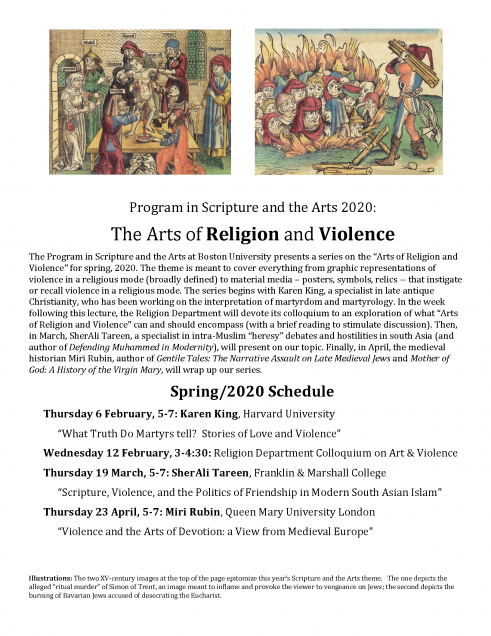
“Keeping the Goddess in Place in South India: Architectural Changes Transforming Village Goddesses” with Joyce Burkhalter-Flueckiger
This talk is part of a larger project that analyzes the agency of five different materialities, beyond what human interactions and/or agency may be in the use of those materials. In this talk, I focus on one of these forms of materiality: the new architecture of small and expanding cement shrines of village goddesses (gramadevatas) that punctuate the rapidly shifting urban landscape of Hyderabad and Tirupati. I analyze the ways these "new" structures can be seen as a material history of urban growth and, most significantly, that they have the potential to change the identity or characteristics of the goddess herself. Gramadevatas traditionally live in open-air spaces on the boundaries of human settlement and on the banks of water sources, protecting those water bodies and the inhabitants of the uru (settlement: home place) from drought and illness. Gramadevatas are moving (cancal) goddesses who have traditionally not permitted permanent structures to be built over or around them; they want to be free to wander beyond their residential sites. However, in the last three decades, gramadevatas are increasingly being "kept in place" through permanent architecture, with or without their permission; and this architecture is changing their identities, the personnel who serve them, and the rituals through which they are served. As one goddess said during possession of one of her devotees, complaining about changes in her temple about which she had not been consulted – "What significance do I have?" implying the question "Who am I?"
Co-Sponsored by the Boston University Center for the Humanities.
Free and Open to the Public
When: Thursday February 21, 2019 at 5:o0 pm
Location: 147 Bay State Road, The Boston University Judaic Studies Center, room 201
Transportation: Closest T stop is the B Line on the Green Line at Blandford St.
Closest public parking lot is at 665 Commonwealth Ave, at the corner of Granby St. and Commonwealth.
Material Religion Lecture Series: “Visual Piety and the Construction of Children in the Modern Islamic World” with Jamal Elias
Thursday, February 21, 2019
The Scripture and the Arts program is proud to present our first speaker of 2019, Dr. Jamal Elias speaking on "Visual Piety and the Construction of Children in the Modern Islamic World." Elias, the current chair of the Department of Religious Studies at UPenn, is a Walter H. Annenberg professor of the Humanities. Using a wide range of visual and written sources, Elias will investigate childhood in the modern Islamic world and explore the way concepts of innocence and cuteness influence social understandings of ethics, morality, and community. Focusing primarily on visual representations of children from modern Turkey, Iran, and Pakistan, he will discuss important questions of gender, virtue, and devotion, as well as community, nationhood, violence, and sacrifice. In exploring a subject that has never been studied comparatively before, Elias will attempt to extend the boundaries of our understanding of emotion, religion, and visual culture and provide unique insight into Islam as it is lived and experienced in the modern world.
ScripArts Feb 2019 FlyerCo-Sponsored by the Boston University Center for the Humanities.
Free and Open to the Public
When: Thursday February 21, 2019 at 5:o0 pm
Location: 147 Bay State Road, The Boston University Judaic Studies Center, room 201
Transportation: Closest T stop is the B Line on the Green Line at Blandford St.
Closest public parking lot is at 665 Commonwealth Ave, at the corner of Granby St. and Commonwealth.
Flyer attached
2017-2018 Events
The Boston University Program in Scripture and the Arts Presents “The Unfolding of Scripture Through Movement”
The Program for Scripture and the Arts is proud to present a brief preview of the speakers featured in this coming year’s events! This posting will be updated as more details about the events become available. Mark your calendars for an exciting year of Scripts!
Self-presentation in Egyptian Funerary Monuments of the Middle Kingdom
Tuesday, April 3rd, 5:00-6:30pm: Dr. Denise Doxey
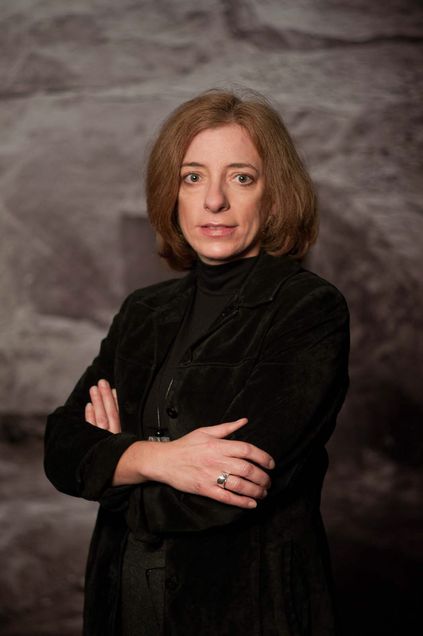 Denise Doxey is Curator, Ancient Egyptian, Nubian and Near Eastern art at the Museum of Fine Arts, Boston. Before joining the staff of the MFA, she was Keeper of the Egyptian Section of the University of Pennsylvania Museum of Archaeology and Anthropology. She completed her B.A. at the State University of New York at Albany, her M.Phil at Oxford University and her Ph.D. at the University of Pennsylvania. She is the author or co-author of four books and nu
Denise Doxey is Curator, Ancient Egyptian, Nubian and Near Eastern art at the Museum of Fine Arts, Boston. Before joining the staff of the MFA, she was Keeper of the Egyptian Section of the University of Pennsylvania Museum of Archaeology and Anthropology. She completed her B.A. at the State University of New York at Albany, her M.Phil at Oxford University and her Ph.D. at the University of Pennsylvania. She is the author or co-author of four books and nu
merous articles on various aspects of Egyptian and Nubian art, archaeology and civilization. She has excavated in Greece and Egypt and has taught Egyptology courses at the University of Pennsylvania and Harvard University. At the MFA, she was the co-curator of The Secrets of Tomb 10A: Egypt 2000 BC and Gold and the Gods: Jewels of Ancient Nubia. She currently serves on the board of ICOM’s International Committee for Egyptology and is president of the New England Chapter of ARCE.
During Egypt’s Middle Kingdom (ca. 2040-1640 BCE), the funerary monuments of regional officials integrated scenes and inscriptions created to demonstrate that they had lived and served in accordance with maat, the concept of justice and world order. Because these officials served as intermediaries between the people of their districts and the central government, tomb scenes portray them as rulers over the local population while, at the same time, offering formulas and autobiographies display humble obedience to the king and, through him, to the gods. Dr. Doxey’s talk will discuss her research into how texts and images were strategically combined to serve as a sort of curriculum vitae for admission to the afterlife, while also exploring their intended audiences, non-royal, royal, and divine.
Event will be held in the Executive Boardroom at the Boston University Elie Wiesel Center for Jewish Studies (147 Bay State Road Boston, MA 02215) on Tuesday, April 3rd from 5:00-6:30. All interested faculty, graduate and undergraduate students are encouraged to attend.
When Buddhism Turned to Writing
Tuesday, March 20th, 5:00-6:30pm: Professor Richard Salomon
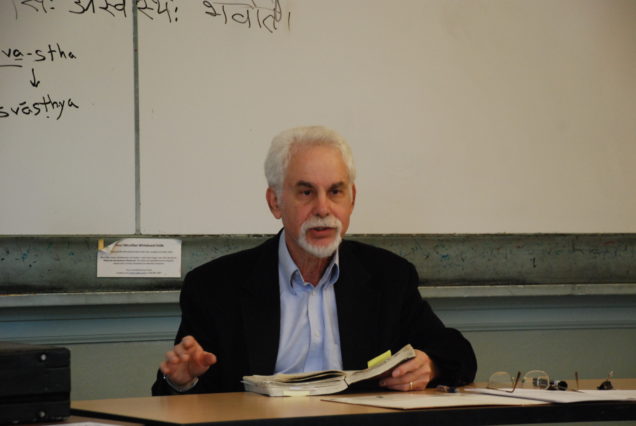
Dr. Richard Salomon is Professor of Asian Languages (Sanskrit) and William P. And Ruth Geberding University Professor at the University of Washington. He also directs the University of Washington’s Early Buddhist Manuscripts Project.
According to the historical traditions of the Theravāda (southern) school of Buddhism, it was around the first century BCE, during a time of crisis and famine, that Buddhists first felt the need to supplement their original purely oral mode of textual preservation by recording the “scriptures” in written form. But until recently, no actual manuscripts from this early period had survived, so that the details of the process of shifting from oral to written transmission were completely unknown.
However, the discoveries in recent decades of hundreds of unprecendently early Buddhist manuscripts from the ancient region of Gandhāra (modern northern Pakistan and eastern Afghanistan), some dating back to the first century BCE, provide specimens of texts from very near the beginning of the written tradition of Buddhism. Examples and illustrations from these Gandhāran manuscripts will show how Buddhist canonical and post-canonical texts were first rendered into written form and how this gradually led to the development of a formal literary tradition.
Event will be held in the library at the Boston University Elie Wiesel Center for Jewish Studies (147 Bay State Road Boston, MA 02215) on Tuesday, March 20th from 5:00-6:30. All interested faculty, graduate and undergraduate students are encouraged to attend.
Back to West African Script Styles: A Taxonomy and Provisional Implications for Historical Analysis
Thursday, February 15th, 5:00-6:30pm: Professor Mauro Nobili, with response by Professor Fallou Ngom
Dr. Mauro Nobili is an Assistant Professor of History & African American Studies at University of Illinois. Dr. Nobili is a historian of pre-colonial and early-colonial West Africa, with a specific interest in the area of the modern Republic of Mali and the town of Timbuktu. His focus is on Muslim societies of the region and their Arabic manuscript heritage. He conducts research in several collections of Arabic manuscripts from West Africa, stored in public or private libraries in Africa (Mali, Nigeria, Senegal, Niger, Ghana, and Ivory Coast), in Europe (Denmark and France) and North America (USA). Nobili has worked and published on topics linked to Arabic calligraphies and script styles, Islamic eschatology, genealogies and the West African chronicle tradition.
Among the different aspects of the literate cultures of Islamic West Africa that have been neglected by scholars is the study of the local "styles" of writing the Arabic alphabet. Most of the time, scholars refer to the styles displayed in West African Arabic-based manuscripts as maghribi - the script peculiar of North Africa west of Egypt. Others employ the "umbrella term" sudani - which is in fact used to describe a "degenerated version" of the maghribi . In his paper, Professor Nobili first explores the genealogy of the term sudani and proves its inadequacy to represent the many different styles found in West African manuscripts. Then, he introduces his more accurate yet preliminary classification of such styles, comparing three of them (Saharawi, Suqi, and Barnawi) and presenting their paleographic features. He concludes by showing how the analysis of West African scripts is not a futile exercise of paleography. On the contrary, it provides crucial information on the development of literacy in different parts of West Africa.
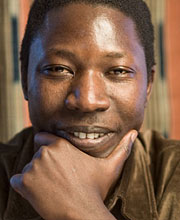 Dr. Fallou Ngom’s current research interests include the interactions between African languages and non-African languages, the Africanization of Islam, and Ajami literatures—records of West African languages written in Arabic script. He hopes to help train the first generation of American scholars to have direct access into the wealth of knowledge still buried in West African Ajami literatures, and the historical, cultural, and religious heritage that has found expression in this manner. Another fascinating area of Dr. Ngom’s work is language analysis in asylum cases, a sub-field of the new field of forensic linguistics. His work in this field addresses the intricacies of using knowledge of varied West African languages and dialects to evaluate the claims of migrants applying for asylum and determine if the person is actually from the country that he or she claims. Dr. Ngom’s work has appeared in the International Journal of the Sociology of Language, Journal of Multilingual and Multicultural Development, Language Variation and Change, and African Studies Review, among others.
Dr. Fallou Ngom’s current research interests include the interactions between African languages and non-African languages, the Africanization of Islam, and Ajami literatures—records of West African languages written in Arabic script. He hopes to help train the first generation of American scholars to have direct access into the wealth of knowledge still buried in West African Ajami literatures, and the historical, cultural, and religious heritage that has found expression in this manner. Another fascinating area of Dr. Ngom’s work is language analysis in asylum cases, a sub-field of the new field of forensic linguistics. His work in this field addresses the intricacies of using knowledge of varied West African languages and dialects to evaluate the claims of migrants applying for asylum and determine if the person is actually from the country that he or she claims. Dr. Ngom’s work has appeared in the International Journal of the Sociology of Language, Journal of Multilingual and Multicultural Development, Language Variation and Change, and African Studies Review, among others.
Event will be held in the library at the Boston University Elie Wiesel Center for Jewish Studies (147 Bay State Road Boston, MA 02215) on Thursday, February 15th from 5:00-6:30. All interested faculty, graduate and undergraduate students are encouraged to attend.
Spring 2018 Schedule:
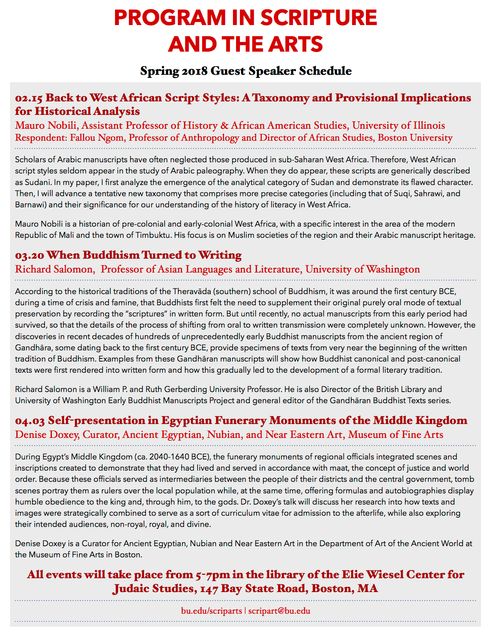
Pure Words from the Water: Haudenosaunee Uses of Wampum
Friday, October 13th, 5:00-7:00pm: Professor Philip P. Arnold
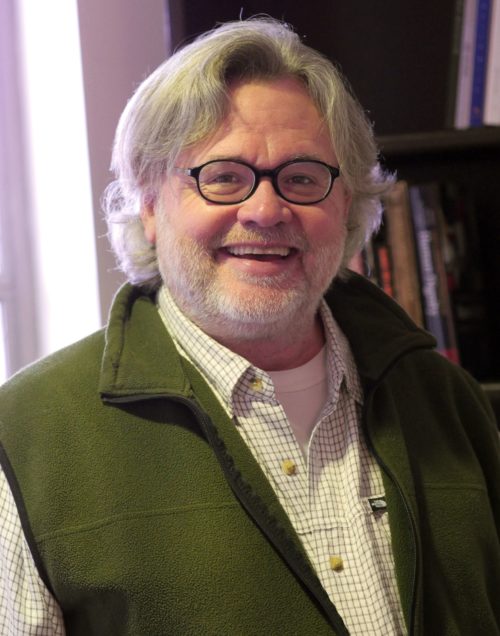
Philip P. Arnold is Associate Professor and Chair of Religion Department at Syracuse University as well as core faculty in Native American and Indigenous Studies. He is the Director of the Skä·noñh—Great Law of Peace Center (www.skanonhcenter.org/). His books are Eating Landscape: Aztec and European Occupation of Tlalocan (1999); Sacred Landscapes and Cultural Politics: Planting a Tree (2001); The Gift of Sports: Indigenous Ceremonial Dimensions of the Games We Love (2012) and Urgency of Indigenous Religions (University of New Mexico Press, forthcoming). He is a founding member of Neighbors of the Onondaga Nation (NOON), (www.peacecouncil.net/NOON/index.html) and established the Doctrine of Discovery Study Group (www.doctrineofdiscovery.org) He is the President of the the Indigenous Values Initiative (www.indigenousvalues.org), a non-profit organization to support the educational work of the Skä·noñh—Great Law of Peace Center.
Professor Arnold will be presenting on his latest work, entitled “Pure Words from the Water: Haudenosaunee Uses of Wampum”. The Haudenosaunee (Iroquois) have used wampum for millennia. It is connected with the founding events of the “Great Law of Peace,” which took place in what is now known as Central New York. This epic story depicts how the 5 warring nations (Mohawk, Oneida, Onondaga, Cayuga, and Seneca) came together in peace at Onondaga Lake (near Syracuse) through the use of wampum in condolence ceremonies established by the Peacemaker for Hiawatha and the Tadodaho. Wampum is used in strings and belts from the time of the Peacemaker until today and is understood to denote a purity of intention in speech, because of its relationship with water. It has been an important feature of the Haudenosaunee treaty relationships with European and American governments.
Flyer to come. Event will be held in the library at the Boston University Elie Wiesel Center for Jewish Studies (147 Bay State Road
Boston, MA 02215) on Friday October 13th from 5:30-7:30. All interested faculty, graduate and undergraduate students are encouraged to attend.
Seasonal Gods and Cosmic Kings: The Politics of Belief on a Classic Maya Lintel
Wednesday, November 1st, 5:00-7:00pm: Professor Stephen Houston
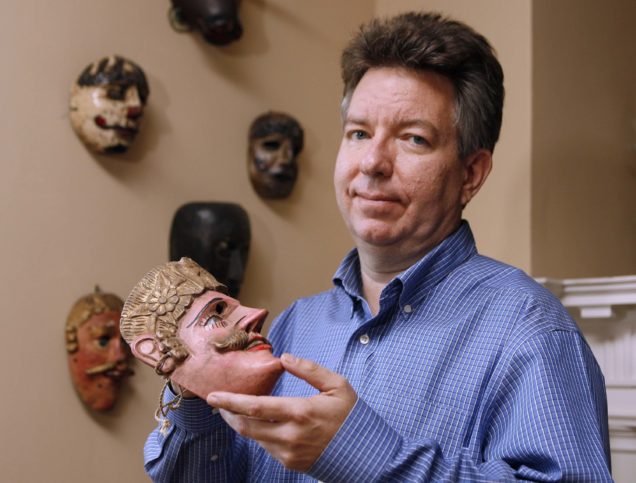
Stephen Houston serves as the Dupee Family Professor of Social Sciences at Brown University, where he also holds an appointment in Anthropology. A specialist in Classic Maya civilization, writing systems, and indigenous representation, Houston is the author of many books and articles, including, most recently, Temple of the Night Sun (Precolumbia Mesoweb Press), The Maya (with Michael Coe, now its 9th edition), and The Life Within: Classic Maya and the Matter of Permanence (Yale University Press), winner of a PROSE Award in 2014. He was co-curator, too, of a major show, Fiery Pool: The Maya and the Mythic Sea, which was exhibited at the Peabody-Essex Museum, the Kimbell, and the St. Louis Museum of Fine Arts. Houston has been honored with a MacArthur, along with fellowships and grants from the Guggenheim Foundation, the National Science Foundation, Dumbarton Oaks, the Clark Art Institute, and the National Endowment for the Humanities; he has also been the Ailsa Mellon Bruce Senior Fellow at the Center for Advanced Study in the Visual Arts, National Gallery of Art. His current projects concern the central role of young men in Classic Maya text and image, the lives and roles of Maya sculptors, and reports on two large-scale excavations, one at the great dynastic center of Piedras Negras, Guatemala, the other, El Zotz, in the same country. In recognition of Houston's scholarship, the President of Guatemala awarded him, in 2011, the Grand Cross of the Order of the Quetzal, that country's highest honor. For that same body of work, Houston also received the Tatiana Proskouriakoff Award in 2013 from the Peabody Museum, Harvard University. He is a summa cum laude graduate of the University of Pennsylvania; his Ph.D., awarded in 1987, is from Yale.
Professor Houston's work, entitled "Seasonal Gods and Cosmic Kings: The Politics of Belief on a Classic Maya Lintel" covers a set of monuments that graft Maya dynastic politics onto concepts of sun, moon, seasons, and other solar patterns. Among the most potent images in the Maya world are those that fuse dynastic needs with mythic verities. Kings and nobleman come to discharge, or are seen to discharge, roles and duties set in the remote past. Expansive beings, the gods themselves, undertake tasks that humans can emulate. Through deity impersonation, those same people become one with supernatural figures. A compact illustration of these themes is a set of lintels taken over 50 years ago from what is now the Republic of Guatemala. For the most part, the carvings have languished in obscurity, only to re-emerge, after decades, in the recent past. A fresh set of images and technical assays permits a re-examination of their content, in sculptures commissioned for an unknown site under the control of the kingdom of Yaxchilan, Mexico. One carving in particular, to be studied closely here, grafts the supernatural and the political in a work that exemplifies Classic Maya fusions of identity. In doing so, it engenders a sense of inevitability, likening dynastic statecraft, hierarchy, and acts of building to the cosmic order of gods.
Flyer to come. Event will be held in the library at the Boston University Elie Wiesel Center for Jewish Studies (147 Bay State Road
Boston, MA 02215) on Wednesday, November 1st from 5:30-7:30. Reception will follow in the Boardroom of the Elie Wiesel Center. All interested faculty, graduate and undergraduate students are encouraged to attend.
2016-2017 Events
The Boston University Program in Scripture and the Arts Presents “The Unfolding of Scripture Through Movement”
The Program for Scripture and the Arts is proud to present a brief preview of the speakers featured in this coming year’s events! This posting will be updated as more details about the events become available. Mark your calendars for an exciting year of meaning in movement!
Thursday, November 3, 5:30 PM: Yolanda Covington-Ward Lecture
Lecture: Gesture and Power
Sargent (635 Commonwealth Ave), Room 102
Yolanda Covington-Ward is a professor of Africana Studies at the University of Pittsburgh. Trained as an anthropologist, she is the author of Gesture and Power: Religion, Nationalism, and Everyday Performance in Congo (2015, Duke University Press). Her research interests revolve around the relationship between social connections, interpersonal interactions, and group identities, and how they impact and are impacted by physical bodies. She has conducted extensive ethnographic research in the Democratic Republic of Congo and among Liberian communities in the United States. Her lecture will focus on embodiment and religion as explored in her recent book. We are excited to bring this important work to colleagues in religion, literature, anthropology, and African studies.
Friday, November 4th, 10:00-11:00AM: Yolanda Covington-Ward
Workshop
William O. Brown Seminar Room (505), African Studies Center (232 Bay State Rd)
Professor Covington-Ward will hold a workshop for faculty and graduate students on Friday, November 4, from 10 AM -11:30 AM in the William O. Brown Seminar Room (505) in the African Studies Center (232 Bay State Rd). The workshop will be on her ongoing work on Liberian diasporas entitled “I Don’t Even Know Monrovia in the First Place”: Displaced Bodies and Shifting Identities in the Liberian Diaspora. Please RSVP for a pre-circulated paper: https://goo.gl/forms/CMPEtQg8gVbcjqxk1. More details found here.
Monday, February 13, 2:30-4:00 PM: Jeffrey S. Shoulson
Forum: Mapping and Unmapping Jewish History in Early Modern Bibles
Elie Wiesel Center for Jewish Studies, 2nd Floor Library (147 Bay State Rd)
Boston University Jewish Studies Research Forum and the BU Program in Scripture and the Arts are pleased to welcome Professor Jeffrey S. Shoulson. Shoulson is Doris and Simon Konover Chair of Judaic Studies, Director of the Center for Judaic Studies and Contemporary Jewish Life, Professor of Literatures, Cultures, and Languages, and Professor of English at the University of Connecticut. He is also author of Milton and the Rabbis: Hebraism, Hellenism, and Christianity (2001) and Fictions of Conversion: Jews, Christians, and Cultures of Change in Early Modern England (2013). He is also co-editor of Hebraica Veritas? Christian Hebraists and the Study of Judaism in Early Modern Europe (2004).
“Mapping and Unmapping Jewish History in Early Modern Bibles” will examine the role played by maps depicting the Holy Land and other biblical locations—printed in Bibles as well as in other accounts of the region—in the construction of spaces construed as “Jewish.”
Monday, March 27, 5:30 PM: Leah Lowthorp and Finnian Moore Gerety, with Frank Korom, Moderator
Lecture: Performing Sanskrit Scripture in Kerala, India
Photonics Colloquium Room, Photonics Building, 9th Floor (8 St. Mary’s Street)
Leah Lowthorp holds a dual doctoral degree in Anthropology and Folklore & Folklife from the University of Pennsylvania and is currently a postdoctoral fellow in Folklore and Mythology at Harvard University. As part of her dissertation work on the impact of UNESCO recognition of Kūtiyāttam as an Intangible Cultural Heritage in Kerala, India, she was trained in the techniques and performance of the tradition. She has a unique ability to bridge the divide between “study of” and “participation in” this tradition, and in her lecture/demonstration she will share her perspective on “the ways artists emically conceive of rituality in relation to contemporary practice both inside and outside of the temple.”
Finnian M. Gerety holds a doctoral degree from the Department of South Asian Studies at Harvard University and is Visiting Assistant Professor of Religious Studies at Brown University. He works on ritual, text, and the senses in South Asian religions, with a focus on Hindu traditions of India. He has authored an article soon to appear in The Journal of Asian Ethnology entitled “Digital Guru: Embodiment, Technology, and the Transmission of Traditional Knowledge in Kerala,” which explores the manner in which the Nambudiri Brahmins of the South Indian state of Kerala transmit “what may be the oldest surviving musical culture in South Asia, a fixed oral tradition of sacred songs used in ritual (sāmaveda). Without recourse to written notation, Nambudiri practitioners teach songs face-to-face, using their voices and a distinctive system of hand gestures to convey melodies to their students.”
Frank Korom is Professor of Religion and Anthropology at Boston University.
Monday, March 27, 2:30-3:45: Leah Lowthorp
Workshop
Workshop will be held during Professor Kyna Hamill’s TH 102, Dramatic Literature Course. All members of the BU community are welcome to attend. Please email scripart@bu.edu for more information.
Monday, April 24, 5:30 PM: Margot Fassler
Planetarium Presentation: Cosmos and Creation in the Twelfth Century: An Interpretation of Genesis 1
Boston Museum of Science Planetarium
Margot Fassler is a musicologist known for her innovative work at the intersection of music, liturgy, and theology in medieval European Christianity. Before taking up her current position in the departments of music and theology at Notre Dame, she taught for many years at the Institute for Sacred Music at Yale University, serving as director for ten years. Her most recent book, The Virgin of Chartres: Making History through Liturgy and the Arts (Yale University Press, 2011), is a prize-winning exploration of the intersections between liturgy, theology, and architecture at the famous Chartres Cathedral in France.
Her newest work on Hildegard of Bingen, supported by a Guggenheim and an ACLS Digital Innovation Fellowship, explores the way that liturgy, theology, music, drama, and the visual arts work together. Fassler has worked with digital artist Christian Jara and the planetarium staff at the University of Notre Dame to develop a digital model of Hildegard’s complex visualization of creation. This model of the universe, based on Hildegard’s treatise Scivias, is a full-dome digital presentation with music, created by Christian Jara and Margot Fassler, with a soundtrack by musicians from the Notre Dame Program in Sacred Music based on chants by Hildegard relating to her vision of the cosmos as it was created and spins in time toward its end.
Hildegard of Bingen (1098-1179) was a German nun, a prophet who wrote theological treatises, biblical commentary, nearly 400 letters, poetry and drama; she composed music, and designed art works. She was a scientist too, and had great interest in the cosmos, its creation, and its meanings as a work of divine inspiration. To display this work Fassler and Jara constructed a model depicting stages of the “Cosmic Egg,” from Hildegard’s description of a big bang within a dark chaos to a spinning and fully zoomable globe that grows through six days of development, enhanced by music composed by Hildegard as a companion to the text/illustration.
Reading Between Word and Image Lecture Series: “The Sacred Art of Ethiopia” with Gary Vikan
Monday April 4, 2016
The Program in Scripture and the Arts is proud to present the third and final speaker in its 2015-2016 speaker series, Gary Vikan speaking on “The Sacred Art of Ethiopia.” Professor Vikan, the Benedict Distinguished Visiting Professor at Carleton College, was also the director of the Walters Art Museum for 18 years and brings a wide range of expertise to his brief visit to Boston University. Professor Vikan will engage with how Ethiopian Christian art is distinctive from that of Byzantium and “western" Christianity in style and iconography as well as in the ritual of its use, how Jesus has been understood and portrayed in Ethiopia, and who the great Ethiopian artist Fere Seyon was in this context. He will discuss the history and character of Ethiopian Christian art—icons, manuscripts, and crosses—from its first tentative appearance on fourth-century coinage to the eighteenth century. The lecture will draw heavily on objects in the Walters Art Museum collection in Baltimore, which is the finest of its kind outside of Ethiopia, but will also address other works, including the great “Holy Land” architectural complex at Lalibela.
Reading Between Word and Image Lecture Series: “Holy Beds and Holy Families: Encounters with Devotional Objects in the Metropolitan Museum of Art” with Caroline Walker Bynum
Thursday, March 24, 2016
The Program in Scripture and the Arts is proud to present the second speaker in its 2015-2016 speaker series, Caroline Walker Bynum, from the Institute for Advanced Study. Professor Bynum is a preeminent scholar in the field of Medieval Christian Studies, and her work has been instrumental in introducing the concept of gender into the study of medieval Christianity. In this lecture, she will present material thematically linked to her most recent publication, Christian Materiality. At an exhibit in Detroit fifty-five years ago, a much loved beguine cradle on loan from New York's Metropolitan Museum was treated simply as a piece of furniture. But at the Met, the cradle, which once held a Christ child laid in it by the religious women in whose community it stood, points the viewer toward other works related to the holy family, all on display nearby but not usually considered together. Interpreting these devotional objects in their social and devotional context, Professor Bynum will argue that medieval images—both literary and material—evoked, even compelled, a far more complex, nuanced, and even contradictory sense of the holy than much recent work on materiality suggests.
Co-Sponsored by the Boston University Center for the Humanities.
Free and Open to the Public with reception to follow
“Reading Between Word and Image” Lecture Series: “Medium and Message: Decoding the Mosaic Message in ‘Abd al-Malik’s Dome of the Rock” with Marcus Milwright
The Program in Scripture and the Arts is proud to present the first speaker in its 2015-2016 speaker series, Marcus Milwright, from the University of Victoria Department of Art History and Visual Studies. Professor Milwright is an authority on the art and architecture of the Islamic Middle East, cross-cultural interaction in the Medieval and early Modern Mediterranean, and craft practices in Late Ottoman Syria. In this lecture, he will examine the golden mosaic inscriptions on the seventh-century Dome of the Rock in Jerusalem. These inscriptions contain professions of faith, verses drawn from the Qur’an, and other statements of a religious nature. Professor Milwright will consider this mosaic writing in the context of late antique craft practices and early Arabic epigraphy in order to suggest new ways of understanding the messages conveyed by the mosaic inscriptions and their role in the ideological program of the early Islamic state.
Co-Sponsored by the BU History of Art and Architecture Department, The BU Institute for the Study of Muslim Societies and Civilizations, and the Boston University Center for the Humanities
Free and Open to the Public
“The Language of Divinity: Modernity and the Deep Past” Lecture Series: “What Jews Talk About When They Don’t Talk About Judaism” with Daniel Boyarin
The Program in Scripture and the Arts is proud to present the third and final speaker in its 2014-2015 speaker series, Taubman Professor of Talmudic Culture, Departments of Near Eastern Studies and Rhetoric, University of California Berkeley, Daniel Boyarin. Professor Boyarin is a historian of religion and Talmudic culture whose work on Jewish identity and Talmud hermeneutics has crucially informed the contemporary study of early Judaisms. In this lecture, he will argue that the term "Judaism" is irrelevant for ancient Jewry, demonstrating how such prominent Judaean (Jewish) writers as Josephus perceived the practices of the Judaeans in ways that did not set apart some putative "Judaism" or mark the Judaeans as structurally different from the other peoples of the Mediterranean.
Co-Sponsored by the Elie Wiesel Center for Judaic Studies and the Boston University Center for the Humanities
Free and Open to the Public
When: Thursday, April 30 2015 at 5:30 pm, lecture with reception to follow
Location: The Castle at Boston University (225 Bay State Rd, Boston, MA)
Transportation: Closest T stop is the B Line on the Green Line at BU Central; closest public parking lot is at 665 Commonwealth Ave, at the corner of Granby St. and Commonwealth.
“The Language of Divinity: Modernity and the Deep Past” Lecture Series: “The Voice of Prayer/ The Media of Prayer” with Niklaus Largier
The Program in Scripture and the Arts is proud to present the second speaker in its 2014-2015 speaker series, the Sidney and Margaret Ancker Chair in the Humanities and Professor of German and Comparative Literature at the University of California-Berkeley, Niklaus Largier. Professor Largier is currently working on a book on imagination, practices of figuration, aesthetic experience, and notions of possibility, tentatively entitled “Figures of Possibility.” His talk, entitled "The Voice of Prayer/The Media of Prayer," will focus on the modern fascination with medieval mystical texts and discuss the ways in which so-called mystical experience takes shape aesthetically, sensually, and emotionally. At the center of his interest lies the medieval understanding of prayer as the medium through which mystical experience is produced, a medium that shapes sensation and affect and anticipates what nowadays is called aesthetic experience.
Co-Sponsored by the Boston University Center for the Humanities
Free and Open to the Public
When: Thursday, February 19 2015 at 6 pm lecture with reception to follow
Location: Boston University George Sherman Union (775 Commonwealth Ave), room 320-21. Reception to Follow in the GSU Terrace Lounge.
Transportation: Closest T stop is the B Line on the Green Line at BU Central; closest public parking lot is at 665 Commonwealth Ave, at the corner of Granby St. and Commonwealth.
About Niklaus Largier:
Niklaus Largier is Sidney and Margaret Ancker Chair in the Humanities and Professor of German and Comparative Literature at the University of California-Berkeley, where he is also affiliated with the Programs in Medieval Studies and Religious Studies. His research deals with German literature and philosophy, especially questions of the relations among literature, philosophy, theology, and other fields of knowledge. He is an expert on mystical traditions in German literature and thought, in particular Meister Eckhart and his influence from the Middle Ages to postmodern discourses. His most recent books explore the relation between bodily ascetic practices (in particular flagellation), eroticism, and the literary imagination (Lob der Peitsche: Eine Kulturgeschichte der Erregung. Beck, Munich, 2001 / In Praise of the Whip: A Cultural History of Arousal. ZONE Books, 2007) and the fascination of decadent literature with such religious practices (Die Kunst des Begehrens: Dekadenz, Sinnlichkeit und Askese. Beck, Munich, 2007). His other books include a study on time and temporality in late medieval philosophy and literature (1989), a bibliography of literature on Meister Eckhart (1989), a translation and commentary of a medieval treatise on spiritual poverty (1989), a two-volume edition of Meister Eckhart’s works with extensive commentaries in the Deutscher Klassiker Verlag (1993), and a study of the significance of exemplum and exemplarity in medieval literature, philosophy, and historiography (1997). Largier has published essays on Eckhart, Tauler, Seuse, Mechthild of Magdburg, Hadewijch, Rudolf of Biberach, Czepko, and others; and, more recently, a series of articles on the interaction of images and texts in medieval manuscripts, questions of visual culture, and the significance of exemplarity in various discursive contexts.
“The Language of Divinity: Modernity and the Deep Past” Lecture Series: “Sacramental Poetics” with Regina Schwartz
The Program in Scripture and the Arts is proud to announce its three-part lecture series for 2014-2015, The Language of Divinity: Modernity and the Deep Past. The first speaker in this series will be Pulitzer prize nominee Regina Schwartz, Professor of English at Northwestern University, who will deliver a lecture at BU entitled "Sacramental Poetics" on October 14. This lecture will explore how the impulses that inform ritual can govern poetry. How, for instance, can the spiritual cravings for communion with Divinity addressed by the Christian sacrament of the Eucharist be expressed in verse? Surely as sign-making characterizes the Eucharist, is also does poetry, which is similarly engaged in making present what is absent--not just in select figures of speech, like the apostrophe, but in the very poetic enterprise. What is the sacramental character of language and how does it inflect communication?
When: Tuesday, October 14, 2014, 6 pm lecture with reception to follow
Location:147 Bay State Road, Elie Wiesel Center for Judaic Studies, 2nd floor board room (Room 201)
From the Northwestern University English Department Faculty page:
"Regina Schwartz (Ph.D. University of Virginia) teaches seventeeth-century literature, especially Milton; Hebrew Bible; philosophy and literature, law and literature, and religion and literature. Her publications include Remembering and Repeating: Biblical Creation in Paradise Lost (1988), which won the James Holly Hanford prize for the best book on Milton; The Book and the Text: The Bible and Literary Theory (1990); Desire in the Renaissance: Psychoanalysis and Literature (1994); The Postmodern Bible (1995) and Transcendence: Philosophy, Literature, and Theology Approach the Beyond (2004). The Curse of Cain: The Violent Legacy of Monotheism (1997), a study of identity and violence in the Hebrew Bible, was nominated for a Pulitzer Prize. Her most recent book, Sacramentality at the Dawn of Secularism: When God Left the World, is published by Stanford in their series "Cultural Memory in the Present" (2007).
She has served as President of the Milton Society of America, Chair of the Modern Language Association Religion and Literature Division and Chair of Northwestern's Interdisciplinary Hiring Initiative in the Humanities. Her recent speaking engagements include featured speaker at the Adelaide Festival of Ideas, the Carnegie Council on Ethics and International Affairs, and international conferences on "Ontology," "The Place of Theology in the Liberal State and Global Setting," and "Derrida and Religion." Her recent essays on postmodern theology appear in Post-secular Philosophy, Questioning God, and Transcendence; on Milton and Renaissance literature in The Blackwell Companion to Milton and The Journal of Religion and Literature; and on Shakespeare and Law in Triquarterly."